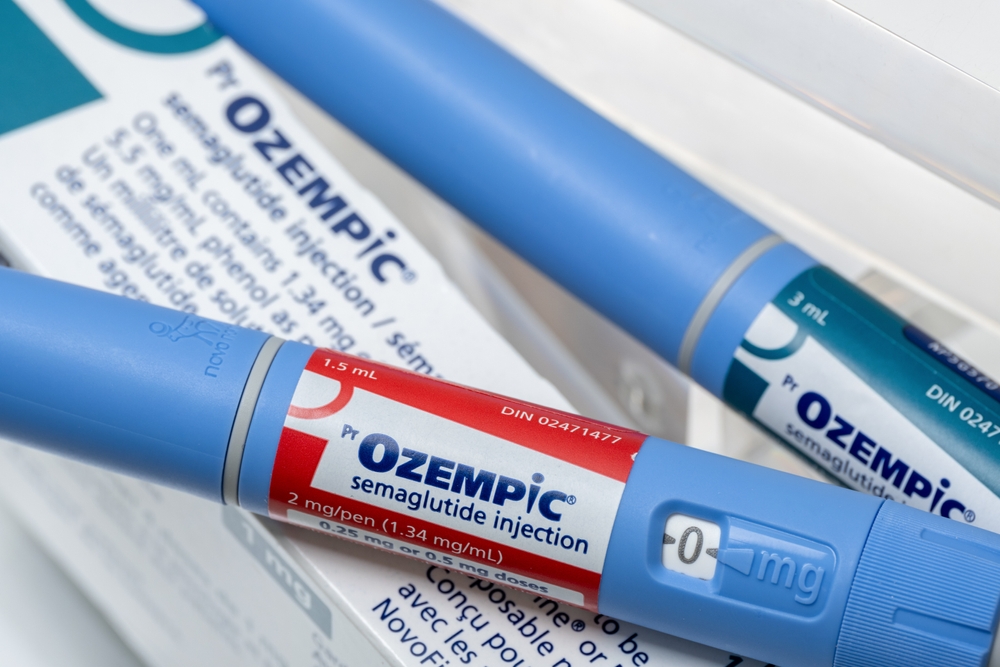Ozempic and other diabetes weight loss drugs have soared in popularity in recent years, with more than 15 million adults in the U.S. taking a GLP-1 agonist. The drugs are designed to treat type 2 diabetes but successfully treat obesity, with the average patient losing up to 15% of their body weight within a year. While the medications have been touted as miracle drugs, there are still questions about whether the long-term benefits offset the risks. Researchers are constantly finding new pros and cons to taking medications, making it difficult for consumers to know whether the good outweighs the bad.
Weight Loss Drugs May Increase Blindness
One recent study published in the journal JAMA Ophthalmology found that patients who took Ozempic or Wegovy were at a higher risk of developing non-arteritic anterior ischemic optic neuropathy, a rare form of blindness that only affects between 2 and 10 out of 100,000 people a year. Physicians at Mass Eye and Ear, a hospital focused on ophthalmology and otolaryngology, examined three patients in one week who had the condition—and all took some form of semaglutide, the active ingredient in Ozempic and similar medications.
The study found that patients who took a semaglutide drug were more than four times as likely to be diagnosed with non-arteritic anterior ischemic optic neuropathy. However, researchers noted that more studies are needed to prove a definitive link between diabetes weight loss drugs and the condition and that patients shouldn’t be deterred from taking the medications due to the relatively rare risk.
Diabetes Drugs Could Lower Cancer Risk
A study published earlier this month in JAMA Network Open found that Type 2 diabetes patients who took a GLP-1 drug were less likely to develop obesity-related cancers. The study focuses on the health records of nearly 1.7 million Type 2 diabetes patients over 15 years from March 2005 to November 2018. Ozempic was introduced in the U.S. in December 2017, so many of the patients were likely taking older GLP-1 agonist drugs. Being overweight or obese increases your risk of developing 13 types of cancer, according to the U.S. Centers for Disease Control and Prevention. The list includes:
- Esophageal cancer
- Breast cancer in postmenopausal women
- Colon and rectum cancers
- Uterine cancer
- Gallbladder cancer
- Upper stomach cancer
- Kidney cancer
- Liver cancer
- Ovarian cancer
- Pancreatic cancer
- Thyroid cancer
- Meningioma
- Multiple myeloma
These diseases account for 40% of all of the cancers diagnosed in the U.S., and many of them have high fatality rates. Researchers found that diabetes drugs led to a “significant risk reduction” in 10 of the 13 cancers associated with obesity. Patients who took a GLP-1 agonist were nearly 50% less likely to receive a colon cancer diagnosis. However, some studies have shown an increase in thyroid cancer among GLP-1 agonist users, while others have found no link.
GLP-1 Drugs Might Improve Heart & Kidney Health
Researchers from Sydney’s George Institute for Global Health and Royal North Shore Hospital found that GLP-1 drugs can reduce heart and kidney complications. The study analyzed data from over 72,000 patients and concluded that combining the drugs with flozins, an older class of medications, is an effective form of treatment. Another recent clinical trial found that taking semaglutide can decrease the risk of major kidney failure, chronic kidney disease, and cardiovascular-related death. The clinical trial also found that weight loss drugs can reduce the chances of a patient having a heart attack or stroke and lower the risk of death from any cause.
Weight Loss Drugs and Stomach Paralysis
While the purported benefits of diabetes weight loss drugs are numerous, there’s a potential risk that has led to lawsuits against the manufacturers of Ozempic and similar medications. Gastroparesis, also called stomach paralysis, is a rare condition that prevents the stomach from emptying properly. When gastroparesis occurs, food stays in the stomach for too long, which can lead to obstructions that stop food from moving through the small intestine, which can be fatal. Other complications of gastroparesis include malnutrition, dehydration, and changes in blood sugar levels. The disorder can significantly impact a patient’s quality of life, making living and working normally challenging.
Ozempic, Wegovy, and other medications have been linked to an increased risk of gastroparesis. One study found that weight loss drug users were 66% more likely to develop stomach paralysis when compared to people who didn’t take the medication. There is no known cure, although experts suggest that stopping GLP-1 drugs could reverse the condition. The first weight loss drug lawsuit was filed last August by a diabetic woman who was hospitalized for stomach pain and vomiting after taking weight loss medications. Since then, dozens of patients have filed diabetes weight loss drug lawsuits against manufacturers, including Eli Lilly and Novo Nordisk, alleging that the companies failed to warn consumers about the risk of gastroparesis. The lawsuits have been consolidated into multidistrict litigation (MDL) and are being handled by the U.S. District Court in the Eastern District of Pennsylvania.
In 2023, the U.S. Food and Drug Administration (FDA) added a warning label to Ozempic after receiving reports of ileus from patients. Ileus occurs when the intestines can’t move food or waste from the body and can cause complications, including intestinal perforation, tissue death, and abdominal infections. As of September 2023, the agency had received 33 reports of ileus from patients who took Ozempic, Wegovy, and similar medications. Mounjaro and Wegovy’s labels already contained warnings about the potential for intestinal blockages.
Diabetes weight loss drugs have positive effects, but they can also cause lifelong complications. If you’ve experienced gastroparesis or a related health condition after taking Ozempic, Wegovy, Mounjaro, or another GLP-1 agonist, you should contact an attorney who specializes in diabetes weight loss drug cases to discuss your legal options against the drug’s manufacturer. You may be eligible to recover compensation that can help you as you get better.



